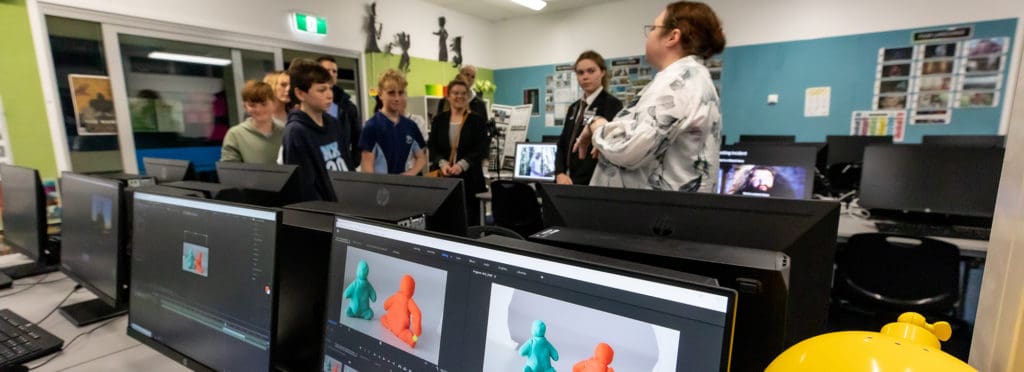
Expectations
Long Bay College’s school values
Care, Respect, Creativity and Community
Our values are based on creating a culture of care for our students and community, which allows our students to achieve in all aspects of school life; Academia, the Arts, Community, Innovation, Leadership and Sport. We support our students to achieve their own levels of personal excellence and become positive and valued members of a global society. By modelling our values, our students are enabled to make solid progress in the classroom, have rewarding experiences in co-curricular activities and develop acceptable social skills. Our desire is for all students to feel a strong sense of belonging at Long Bay College.
We show Care and Respect within the Long Bay College community by:
- Being courteous and polite to others through kindness, care and good manners.
- Students and teachers both take responsibility for the routines of working in a learning environment. Each teacher or class may have different routines (e.g. entering the room, use of the space or equipment, the need to remain seated or to move about).
- Students follow instructions from teachers or leaders in a cooperative and respectful manner.
- Speaking and listening respectfully to the person leading the lesson or to whoever is speaking during the lesson, whether that be a teacher, visitor or other student.
- Displaying behaviour, verbal language and written content that is non-violent and non-threatening, not only in the classroom but in online spaces e.g. social media and digital communications. Physical violence, swearing, verbal abuse or verbal harassment are regarded as very serious offences.
- Being punctual, and if late to class, apologising and showing a late slip from the Student Centre.
- Asking for permission to leave a classroom or learning environment.
- Behaving appropriately in the learning environment; for example, using digital devices only when approved by the teacher and ensuring behaviour doesn’t disrupt learning for self and others.
- Coming to each class prepared and ready to learn with the correct equipment.
- Showing respect for all school property and the property of other students.
Restorative Practices
Key Restorative Principals
- Misconduct is a violation of people and relationships
- Violations create obligations and liabilities
- Restorative practice seeks to heal and put things right
Restorative practice is a relational approach to school life grounded in beliefs about equality, dignity, mana and the potential of all people. The Restorative Positive model focuses on building and maintaining positive relationships across the school community and offers school practice tools and techniques to restore relationships when things go wrong. The Restorative Positive approach to problem solving recognises that misconduct harms people and relationships and that those involved in the problem also need to be involved in finding a solution.
Restorative conversations
- Tell the story.
- Tell me what has happened.
- What has led us to needing to have this conversation?
- What were you thinking when you did that?
- What have you thought about since?
- How does that fit with our values here?
Explore the harm
- Who do you think has been affected? Who else?
- In what ways?
- What do you think it must have been like for them?
- Was that a fair or unfair thing to do? The right or the wrong thing to do?
Repair the harm
- What needs to happen to put things right?
- What do you think (person’s name) needs to hear/see from you now?
- Is there anything else that you can think of that might help?
- What will sorry look like in the action from here?
Reach an agreement
- What do you need to stop doing, stay doing, start doing?
- If this happens again, what could/will you do differently?
- From now on, how will you demonstrate the school values?
- What do you need from me/us to support you?
Plan follow up
- When shall we check in with you to see how you are going?
- What will happen if our agreed outcomes haven’t been reached?
Source: Institute of Professional Learning,The University of Waikato
Long Bay College takes a restorative approach to resolving unacceptable behaviour. Clear consequences, relevant to the behaviour, will be outlined and put into place.
- A verbal warning.
- Sent to the Faculty Referral Room.
- A lunchtime detention/an after school detention.
- Parents contacted.
- A conduct or attendance report may need to
be carried by the student and signed by each class teacher and/or parents/caregivers to monitor progress. - Referral to a member of the College’s Senior Leadership Team or Year Level Dean.
- A stand-down of up to five days per Term, or 10 days per year.
- A suspension and referral to the Board of Trustees (BOT). A BOT Disciplinary Sub Committee interview with parents/caregivers and student is sometimes required for persistent or serious offenders.
After school detention
After school detentions are held at 3.20pm for one hour. They take precedence over any other activity: work, sports practise or leisure/family activity. All students and parents/caregivers are emailed advising of the detention. If a student is unable to attend for good reason, they need to see the Dean in advance.
Any student who has had multiple after-school detentions for the same offence may be required to attend an interview with the Dean, accompanied by their parents/caregivers.
Important note:
All incidences of unacceptable behaviour are considered on their own merits.
Other rules exist for aspects of school life. These are publicised in a variety of ways, as appropriate, for example: the proper use of private student vehicles; the specific behaviours expected in laboratories and workshops; and the behaviours expected on school field trips.
Long Bay College is committed to ensuring all students maximise their educational opportunities. Students who attend school regularly learn more and achieve better results. It is an important role of parents/caregivers to ensure their child is regularly attending school.
- Students must attend and be punctual to school and all classes.
- Students must remain on the premises during the school day unless permission to leave is granted by the school, and they have signed out with the Student Centre. After 4.00pm, students may remain at school only under supervision.
- If a student is absent from school, please contact the Student Centre by phone, email or absence form via the school website on the day by 9:30 am. A phone call, written explanation or email of non-attendance is required from parents/caregivers.
Please phone: 09 477 9009 Ext 878
or email: [email protected]
If notification is not received the absence will be treated as truancy. - Acceptable reasons for absence include illness or serious family circumstances, such as a bereavement.
- If students frequently miss school without an explanation provided, the school will contact the student’s parents/caregivers to request a meeting and to discuss ways to support the student’s attendance. If unexplained absences persist, a formal letter will be sent to parents/caregivers and external agencies may be contacted to follow up on the reason for absences.
Late pass
Students who are late to school must obtain a pass from the Student Centre in order to be admitted to class. A lunchtime detention will be issued for lateness for unjustified reasons.
Year 13 Period 1 Study
Some Year 13 students will have a timetabled study period. When this occurs during Period 1, they may choose to arrive at school later than 8.45am. For Health and Safety purposes, it is important to sign in at the Student Centre if arriving at school after 8.45am and before Period 2.
Prolonged absence
If a student will be undertaking a planned absence from school for longer than three days, parents/caregivers are asked to write a letter or email to the Principal at least two weeks prior to the absence.
Email: [email protected]
- Items, such as large sums of money or electronic equipment, are only allowed at school for school related activities.
- It is important to note that if students do make the decision to bring a phone to the school grounds, they do so at their own risk. The school is not responsible for any loss or damage caused to any phone.
- Students are discouraged from bringing valuable items to school. They do so at their own risk and must ensure their safekeeping.
- The safekeeping of personal belongings is each students individual responsibility.
- Any items confiscated from students at school, such as non-uniform clothing, jewellery or can be collected on Fridays from the Student Centre, 3:15pm.
- Phones, if confiscated, can be collected at the end of the school day, 3:15pm from the Student Centre.
- Alternatively, a parent/caregiver may visit the school via the reception to collect the items.
Our community respects our environment by behaving appropriately and respectfully within the work and social spaces of our school and while representing the college.
- Long Bay College is a drug, alcohol and smoke-free zone (including vaping and e-cigarettes). Students may not be in possession of, using, or dealing in the above items at school, on the way to and from school or during school activities. Any infringements of these rules are regarded as a major breach of school conduct and carry serious consequences.
- Medication prescribed for use during the day must be left at the Medical Centre and collected as required.
- Damage to school buildings or any other school property must be reported promptly to the Property Manager, any Deputy Principal or Teacher.
- Dangerous items are not permitted at school or to be in the possession of any student. These items could include but are not limited to drugs, matches, cigarette lighters, aerosol cans, any potential weapon, and materials or implements commonly associated with the use/misuse of illegal or dangerous substances.
- Chewing gum is not permitted while at school.
- There are signs and markings around the school to identify out-of-bounds areas to students. The Auditorium and Gymnasium are available for student use only if a supervisor is present. Please see out-of-bounds map.
- Students are not to park on the school site during the school day, and must not interfere with parked cars or bikes or use parking areas as access ways.
- The staffroom is private to the staff.
- No student may be on the roof of any school building at any time.
- Students must not leave the school grounds unless they have obtained an official exit pass from the Student Centre. A note, email or telephone call from a parent/caregiver to the Student Centre explaining a valid reason for the exit pass is required before one will be issued. This is so all parties know the safe whereabouts of the students.
We expect all members of the Long Bay College community to use digital devices with respect.
Digital devices are permitted at school but students are discouraged from bringing them unless for educational purposes. Classroom use of devices, such as mobile phones, laptops and tablets as tools for learning is increasing. However, use of these in the classroom is at the discretion of the teacher and must be appropriate to the purpose of the lesson.
The school will not be held responsible for any lost, damaged or stolen devices.
Netsafe
NetSafe New Zealand provides some excellent resources to help manage the complexities of cyberspace. We strongly encourage students and their caregivers to visit Netsafe’s website: netsafe.org.nz
- Mobile phones are to be turned off and placed in bags before entry on to the school grounds.
- Phones will not be used by students on site between 8:00am and 3:15pm (exit bell for the day signals the use of mobile phones for students).
- Mobile phones to remain off and in bags at all times.
- If phones are brought to school, they must be kept in a student’s own school bag.
- If appropriate, permission may be given by teachers for phones to be used as a tool for learning, eg to take a photo, video record an experiment, or to access information.
- At all times, during class time, assemblies and between classes, mobile phones and headphones are to be switched off and in bags.
Phones ‘away for the day’ exemptions
Purchasing school based goods
- Students can use payWave on their phones to pay for school based goods and services for example, at the canteen. But after the purchase phone should then be switched off and placed back in their bag.
Learning activities
- If phones are used for a learning activity, this will be at the teacher’s discretion and the phone’s use will be supervised by a staff member. Guidelines on appropriate usage still apply.
Health and emergency situations
- There may be a small number of students with particular learning or physical/mental health needs which will require some access to phones. These cases will be dealt with on an individual basis to find a solution that meets the needs of the student and the objectives of these rules. Students or Parents who believe there needs to be an allowance made to meet the student’s needs, should discuss the situation with their Year Level Deputy Principal.
- In matters related to a student’s immediate health and safety concerns, a parent or caregiver can apply at any time to the Principal or Year Level Deputy Principal for a period of exemption (e.g., medical conditions or protection issues).
The school upholds and expects students, staff and parents/caregivers to uphold the principles of the Harmful Digital Communications Act:
What are harmful digital communications?
Under the Act, harmful digital communications can be private messages or public content where someone uses the internet, email, apps, social media or mobile phones to send or publish harmful content.
For a communication to be considered harmful under the Act, the content needs to:
- Affect an individual; and
- Cause (or is likely to cause) that individual serious emotional distress; and
- Seriously breach one or more of the 10 communication principles outlined in the Act.
The 10 communication principles
The 10 principles say that a digital communication should not:
- disclose sensitive personal facts about a person;
- be threatening, intimidating, or menacing;
- be grossly offensive;
- be indecent or obscene;
- be used to harass a person;
- make a false allegation;
- breach confidences;
- incite or encourage anyone to send a deliberately harmful message;
- incite or encourage a person to commit suicide; and
- denigrate a person’s colour, race, ethnic or national origins, religion, gender, sexual orientation or disability.
The inappropriate use of any electronic device may result in serious consequences.








